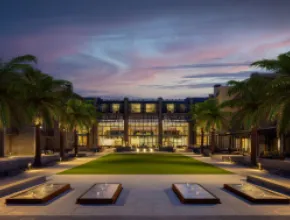It's no accident that this is the most popular destination in Southeast Asia. Life is relatively hassle-free for visitors here, but there are a few things to keep in mind. Courtesy of Tourism Thailand (www.tourismthailand.org), here's everything you need to know about taking your group to Bangkok or anywhere else in "The Land of Smiles."
When to go
Thailand enjoys a tropical climate with three distinct seasons--hot and dry from February-May; rainy but with plenty of sunshine between storms June-October; and cool from November-January.
Customs
Remember that the Thai people treat their king and the royal family with the utmost reverence. All images of the Buddha are sacred, and one should never point their feet at another person or at a religious symbol. Instead of shaking hands, most Thais greet each other and visitors with a slight bow with their palms faced together.
Costs
Bangkok is probably the most expensive city in Thailand, but overall Thailand is still an excellent bargain. A meal at a nice, but not top-of-the-line restaurant will run from $8-$15 per person, including numerous cold beers. Rooms at business-class hotels are hovering at under $200 per night, with deals to be had thanks to the slew of travelers eschewing the capital in favor of the Thailand's island and resort destinations.
Health requirements
Visitors are not required to have vaccinations unless they are coming from or passing through a designated contaminated area. All tourism destinations and provincial capitals have hospitals and clinics staffed by well-trained doctors and nurses. In the case of an emergency, an ambulance can be summoned from any private hospital.
Safety
Generally a safe place, beware of "precious jewel" deals that are too good to be true. Buy valuable items from established stores, not street vendors. Exercise normal caution at night--nobody, especially women, should be alone and/or inebriated on dark streets. If in doubt, take a taxi or tuk-tuk. Whether for scams or personal safety, call the highly capable tourist police at 1155 at the first sign of trouble.
Electricity
European- and American-style plugs at 220V 50HzHz. Almost all business hotels have converters on hand if need be.
Money
The Thai unit of currency is the Baht. $1 equals approximately 32 Baht. An easy way to keep track of costs it to remember that 100 Baht is about $3. Traveler's checks are best changed in banks (you will need your passport) and credit cards are widely accepted in Thailand. Tipping is not a usual practice in Thailand, although it is becoming more common. Most hotels and restaurants add a 10 percent service charge to the bill. Taxi drivers do not require a tip, but the gesture is appreciated and a 10-20 Baht gratuity is acceptable for porters.
Fixed prices are the norm in department stores, but at most other places bargaining is to be expected. Generally, you can obtain a final figure of between 10 percent to 40 percent lower than the original asking price. With patience and smile, you'll get a better price and everyone will enjoy the art of the deal.
Visas
Americans and Canadians can stay in Thailand without a visa for up to 30 days visa-free. If coming for business, a visa is required. Visit: www.thaiembdc.org" target="_blank">http://www.thaiembdc.org and click on Consular Services for more information.





